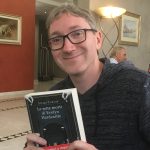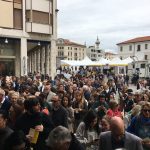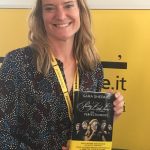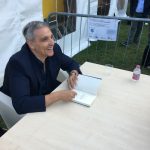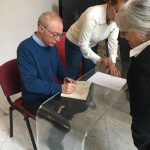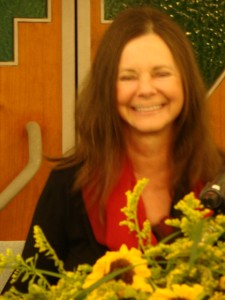“We are never more ourselves than when we think people aren’t watching.”
“If this is not Hell, the devil is surely taking notes.”
(from “The 7 1/2 Deaths of Evelyn Hardcastle”)
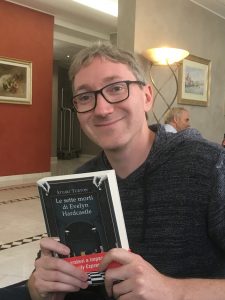
Stuart Turton in Pordenone Italy to release “The 7 1/2 Deaths of Evelyn Hardcastle” translated into Italian.
Stuart Turton, in his debut novel “The 7 1/2 Deaths of Evelyn Hardcastle,” uses familiar themes from popular fiction and reworks them into something original and memorable.
This science fiction/murder mystery takes place in a decaying 1920’s country house called Blackheath. The story begins as our narrator wakes up with no memory of his own identity or how he came to be at the estate.
His name is Aiden Bishop, and he is here for a reason. A mysterious masked figure informs him a murder will be committed and Bishop has eight chances to solve it. He will relive the same day eight times, but each morning he’ll wake up in a different body, or “host.” He’ll remember his experiences from previous hosts, but if he fails to give the masked man the name of the killer by day eight, Bishop’s memories will be erased and he will start all over again.
Bishop finds he has two rivals, also occupying hosts and also tasked with revealing the murderer. Only one of the three can succeed and thereby be freed from the time loop to return to their real life.
And, just to keep your heartbeat elevated, Turton has Bishop being sought by a psychopath knife-wielding footman who targets each host in turn.
That summary does no justice to the mind-boggling complexity of the plot. There is a twist on nearly every page, and there are 500 pages.
Fortunately, Stuart Turton has done a superb job writing it. In spite of the complexity, the story never fails to be engaging and invigorating. His writing is tight and polished and “The 7 1/2 Deaths of Evelyn Hardcastle” is a delightful read.
I had the great fortune of a one-on-one interview with Stuart Turton. He was visiting the small city of Pordenone, Italy during the annual book festival there (If you have never been, make an effort to visit this festival. I have met extraordinary authors including Margaret Atwood, (the late) Umberto Eco, John Banville, Jeffery Deaver, Margaret George, Robert Harris, Peter Hoeg and many more.)
Turton and I sat down in Hotel Moderno to discuss “The 7 1/2 Deaths of Evelyn Hardcastle.”
JS: Tell me about how you kept track of the sophisticated and complicated plot as you wrote. With so many different characters and plenty of time-jumping, it must have been quite a task.
ST: First, I spent three months planning it before I ever wrote a word. I wouldn’t allow myself to get to the dessert before I had my vegetable, so to speak. I had a massive Excel spreadsheet that detailed every two minutes of every character in the house. I started with the murder, for me that was the most important bit. The murder had to feel – not realistic because this is an Agatha Christie style mystery – but it had to be a murder that felt like one someone would want to commit for real reasons. And it had to be not solvable by a time travelling detective.
Once I had that, I did a massive map of the house and grounds in order to be sure an action going on in one place could be witnessed or overheard from another place.
Of course I did have lots of post-it notes and pages and pages of character notes. But then, working so long on it, I internalized it. So that once I had it, it was just in there. I knew every piece of it. I didn’t write chronologically, either. I wrote what excited me from one day to the next. Finally I built it all together.
I had to keep it fair, too. Like an Agatha Christie mystery, I saw it as a game. Everyone gets the same clues at the same time, and the murder gets solved fairly. I thought a few times about putting something else for a more dramatic moment, but had to remember that was not what I set out to do. I set out to be honest.
JS: In television and film, there is a person on the crew called Script Supervisor responsible for continuity in the story. I imagine that was an enormous task with this book. Did you have a team of editors who helped you with that?
ST: Yeah. When I finished the book, as any author does, I felt it was perfect. High fives, slapping myself on the back. Telling myself I am a genius. Well it got bought by my UK publisher and they brought in a timeline editor. So every time of day mentioned in the book, every hour, every minute, she mapped it all out to make sure it could happen the way I said it would happen. The amount of inconsistency she found was horrific. I spent two and half years doing this, I have a massive timeline in my house but she found these things. And of course every time I went back to fix one, another fell apart.
Then I had a copy editor, of course, and we had my brilliant UK editor, Alysson. She read every draft and corrected so much. Then after that, it has been sold in many countries. Each one had an editor and a translator and they all had questions. Finally we reached a point where there aren’t any more errors.
JS: I read that you described the process of writing it as “just awful.” I was going to ask you to explain that, but I think you just did.
ST: Well, not because of the planning bit of it, or the writing. I am not as a personality disposed to sit down in front of a computer all day. It’s just not what I do. I’m relatively active, I like being outside. But once you start writing, after a while you realize all you are doing is waking up at six in the morning and writing until sometimes two o’clock at night. You haven’t done anything else; you haven’t even left your house. And then when you do something else, you realize you’re adding days to the process. It’s getting longer. Every time you’re not working on the book you feel guilty because you’re not working on it. But you don’t want to only work on the book, either. Now that I am working on a second a book and the first one has done well, I have the ability to carve out a more reasonable schedule.
JS: So you don’t have deadlines from your publisher on the second book?
ST: Oh I do. I’ve sailed right by five of those. But I also had a baby. She is wonderful and my publisher has been very understanding. Stupidly, I didn’t think having a baby would impact daily work. “It will be fine, I’ll write at night while she’s asleep, she’ll have a nap during the day.” Honestly this was me two years ago. Incredible.
JS: Well congratulations.
ST: Thank you so much.
JS: The book is written in first person present tense. I have no statistics but it seems most novels are third person past tense. Did you find it difficult to write it that way? And did you even think there was an alternative?
ST: Not for this story, no. It felt like it was the only way this story could be told. With the multiple characters (all of them the narrator) first person present tense works better. I learned many readers don’t like reading first person present because they are not used to it. They don’t like it because it feels uncomfortable.
JS: That’s interesting. The book I am working on now is first person present. I am doing that deliberately because I feel it gives so much more immediacy to the story.
ST: Yeah. I agree. I absolutely agree. I recently did an event with the writer David Mitchell. He had a brilliant line about this. He said when he writes in first person present, he never has writer’s block because as well as he knows his characters, he can write in their perspective. When you write in third there is a distance (from the characters).
JS: The notion of redemption is a significant theme in “Evelyn Hardcastle.” It’s certainly important to the characters in this prison of Blackheath. Do you believe a horrific crime, such as what Annabelle did, can be forgiven? And do you believe a person truly can change?
ST: I think over a long enough period, yes. But I don’t think human life span is at the moment long enough. If you commit a horrific crime and go to prison, you won’t find redemption. That is not the aim of prison. The aim is to punish and destroy, basically. In our heart of hearts, that’s absolutely correct, the way it should be. I think fundamentally that is wrong. I think in terms of humanity what we strive to become, what we hope to become, incarceration should be with more social conscience. But we can’t carry on this way, we can’t keep throwing people into prison, we can’t keep building bigger prisons. It’s unsustainable. We’re going to have to come up with something. We need to get people through the prison system and back into society and not fall back into prison six months later. Recidivism is huge because once punished, always punished. The Annabelle thing was extreme but it had to be for the narrative. Do I believe she could be redeemed? Not in this lifetime not with the system as we have it. If we live longer, and technology is already providing that to some extent, but if we live longer, we can change. I am not the same guy now as I was when I was 20. I easily could have done something incredibly stupid when I was 20. Now I am not the same, but if we live even longer, then I can possibly really truly change. But at some point we have to start forgiving.
JS: I agree, but I am dubious that mankind is ready to have forgiveness become a more important part of our DNA. I don’t know if people are nice enough to do that.
ST: I absolutely agree. If Bin Laden had been captured rather than killed, put away for 60 years and released, it doesn’t matter. He’s still Osama Bin Laden. But I would like us to be that civilization where things can be forgiven. I come from a working class town in the north of England where sadly I know many people in prison. They are not bad people but there are not a lot of options left for them. It’s heartbreaking.
JS: Any thought of making a screenplay of this book?
ST: It’s been bought. A production company has bought it. There might be an announcement in a couple of weeks.
JS: Congratulations. Will you retain any input to that?
ST: No. None whatsoever, I sold the rights and that’s that.
JS: I know you are working on your second book and it is a genre mash-up murder mystery with more horror to it. Not science fiction.
ST: In three weeks is my next (final) deadline. I am having a lot of fun with it.
JS: Who are your favorite writers?
ST: Arundhati Roy is top of that list. “The God of Small Things” is entirely wonderful. What she does with metaphor, rhythm and language is a Master Class in writing. David Mitchell, Franz Kafka and Agatha Christie, obviously.
JS: And what are you reading now?
ST: I am reading “The Dry,” by Jane Harper. A murder mystery set in the Australian Outback in the middle of a heatwave. It’s great.
JS: Well, that’s it. I want to thank you very much for your time.
ST: Thank you.
